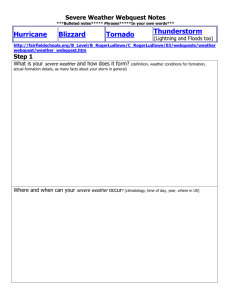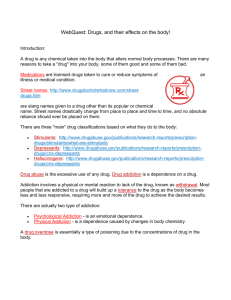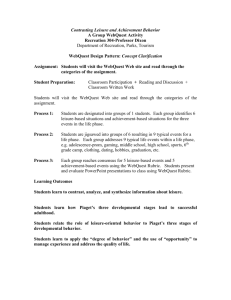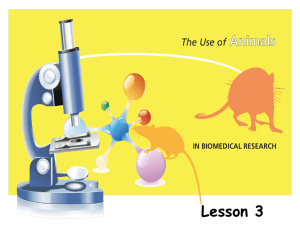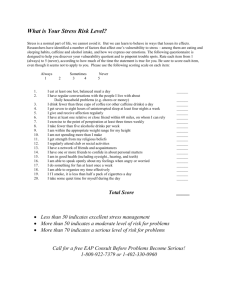Drug WebQuest Worksheets
advertisement
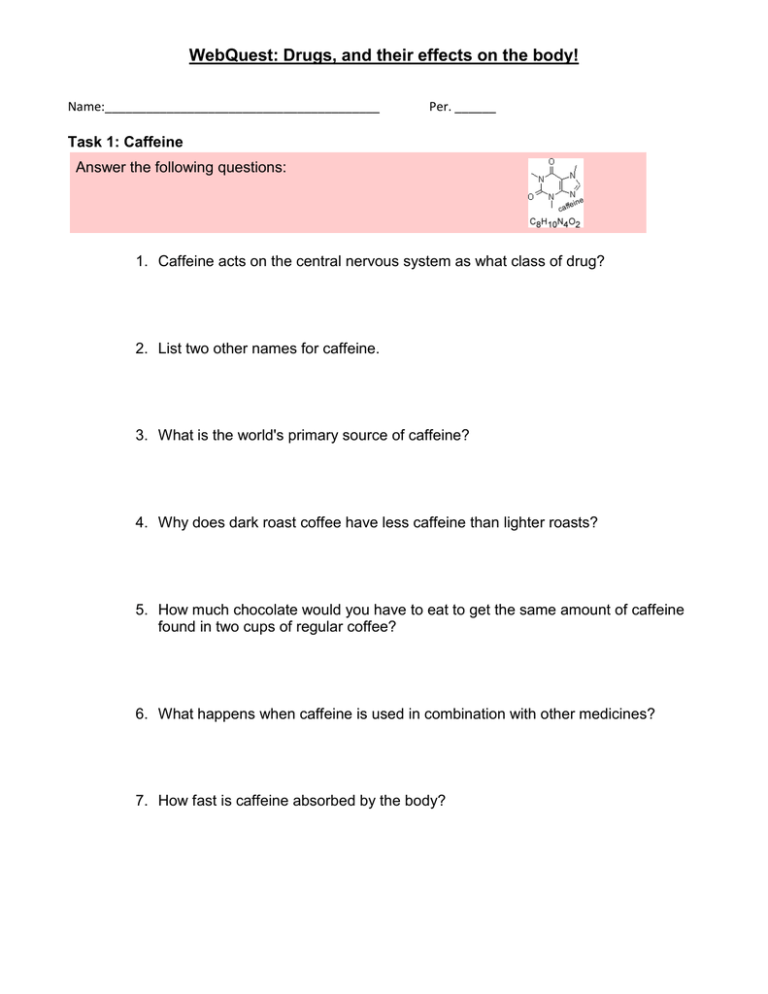
WebQuest: Drugs, and their effects on the body! Name:________________________________________ Per. ______ Task 1: Caffeine Answer the following questions: 1. Caffeine acts on the central nervous system as what class of drug? 2. List two other names for caffeine. 3. What is the world's primary source of caffeine? 4. Why does dark roast coffee have less caffeine than lighter roasts? 5. How much chocolate would you have to eat to get the same amount of caffeine found in two cups of regular coffee? 6. What happens when caffeine is used in combination with other medicines? 7. How fast is caffeine absorbed by the body? WebQuest: Drugs, and their effects on the body! 8. What are the symptoms of caffeine intoxication? 9. Why does a high usage of caffeine lead to peptic ulcers, erosive esophagitis, and gastroesophageal reflux disease? 10. One of the "withdrawal" symptoms from caffeine is a headache. What causes this headache? WebQuest: Drugs, and their effects on the body! Name:________________________________________ Per. ______ Task 2: Nicotine Answer the following questions. 1. Why is nicotine used in many insecticides? 2. Nicotine is a carcinogen, but it does not promote the development of cancer in healthy cells. What does it do? 3. What effect does nicotine have on heart rate and blood pressure? 4. How much nicotine is considered a lethal dose for humans? 5. Nicotine is physically addictive. What are its withdrawal symptoms? 6. How long do the withdrawal symptoms last? 7. Why does chewing tobacco release much more nicotine in the body than smoking tobacco? 8. How many seconds after entering the body does nicotine reach the brain? WebQuest: Drugs, and their effects on the body! Name:________________________________________ Per. ______ Task 3: Methamphetamine Answer the following questions. 1. What class of drug is methamphetamine? 2. Name a prescribed drug that is pure methamphetamine? 3. Methamphetamine was first synthesized from ephedrine using what two chemicals? 4. Methamphetamine was prescribed to the American public in the 1950s for what disorders? 5. One of the effects of meth use is "formication". Describe formication. 6. What is "meth mouth"? 7. Why does use of meth cause long-term cognitive impairment? WebQuest: Drugs, and their effects on the body! 8. What does meth use do to the immune system? 9. What side effect does meth use have on the cardiovascular system of the body? 10. What side effect does meth use have on the endocrinal system of the body? 11. Chronic use of meth can cause severe damage to what two body organs? 12. What is the major reason prolonged use of methamphetamine causes the user to become irritable? 13. What are three serious physiological withdrawal symptoms experienced by meth addicts? WebQuest: Drugs, and their effects on the body! Name:________________________________________ Per. ______ Task 4: Cocaine Answer the following questions. 1. What plant does cocaine come from? 2. What class of drug is cocaine? 3. What does cocaine do to the appetite? 4. What soft drink, in its original 1886 recipe, had a "pinch of coca leaves"? 5. Cocaine is the second most popular illegal recreational drug in the U.S. What drug is first? 6. Why is base cocaine not suitable for drinking, snorting, or injecting? 7. When smoking freebase cocaine, how long does it take the cocaine to reach the brain? 8. What substance makes freebase cocaine extremely flammable? WebQuest: Drugs, and their effects on the body! 9. How did "crack" cocaine get its name? 10. What two physical problems are caused by snorting cocaine? 11. What method of administration of cocaine provides the highest blood levels of the drug in the shortest time? 12. Why does smoking tobacco during cocaine use seem to enhance the euphoria? 13. How long after using cocaine can the metabolites be detected in urine? 14. How long can cocaine be detected in the air of regular users? 15. What country is the world's leading producer of cocaine. WebQuest: Drugs, and their effects on the body! Name:________________________________________ Per. ______ Task 5: Narcotics Answer the following questions. 1. In the U.S. legal context, what drugs are referred to as "narcotics"? 2. What type of narcotics administration is referred to as "mainlining"? 3. Clinically, narcotics are used in the treatment of pain and acute diarrhea. What is another clinical use of narcotics for which you may have had a perscription? 4. Withdrawal symptoms are usually experienced shortly before the time of the next scheduled dose. What are the early symptoms? 5. What are the next withdrawal symptoms to show up? 6. Without intervention, the physical symptoms of withdrawal will last for how long? 7. There are two major patterns of narcotic dependence seen in the U.S. Use one sentence to describe each of these two patterns? WebQuest: Drugs, and their effects on the body! Name:________________________________________ Per. ______ Task 6: Hallucinogens A hallucination is a sensory perception experienced in the absence of an external stimulus, as distinct from an illusion, which is a misperception of an external stimulus. Hallucinations may occur in any sensory mode - visual, auditory, olfactory, gustatory, tactile, or mixed. Answer the following questions. 1. Most hallucinogens have some stimulating effects on the body, but these are not the reason they are used as recreational drugs. What are the three process of the brain that are altered by psychedelics? 2. One class of hallucinogen is psychedelic drugs. What is the primary action of these drugs? 3. Another class of hallucinogen is dissociative drugs. What do these drugs do? 4. Deliriants, or anticholinergics, are a special class of dissociative. What do these drugs do? 5. Who invented LSD and in what year? 6. How was LSD used in psychiatry to study psychotic disorders such as schizophrenia? WebQuest: Drugs, and their effects on the body! 7. Some psychedelics are listed below. Answer the questions about each: A. LSD What do the letters LSD stand for? Generally, how long do the effects of LSD last? What is a "flashback"? B. Psychedelic mushroom What are the two active drugs in psilocybin mushrooms? List the physical effects of psilocybin/psilocin. List the sensory effects of psilocybin/psilocin. List the emotional effects of psilocybin/psilocin. List the intellectual effects of psilocybin/psilocin. C. Psychoactive toad What is the family name for the psychoactive substances produced by these toads? WebQuest: Drugs, and their effects on the body! How do humans who want to get high administer the active drug from these toads? What is "toad licking"? WebQuest: Drugs, and their effects on the body! Name:________________________________________ Per. ______ Task 7: Inhalants Answer the following questions. 1. Inhalants are commonly found in hundreds of household products. All of these substances are composed of two types of chemicals. What are those two types? 2. Solvents are some of the most dangerous substances used recreationally. What damage do they do to the body? 3. What is "huffing"? 4. Why is inhalant abuse common among children and adolescents? WebQuest: Drugs, and their effects on the body! Name:________________________________________ Per. ______ Task 8: Marijuana Answer the following questions: 1. Cannabis is a psychoactive drug. What does that mean? 2. What newspaper baron was instrumental in promoting making marijuana use illegal? 3. How many states provide some legal protection for patients who use marijuana with the consent or recommendation of a doctor? 4. How much marijuana can an adult over 21 have in their possession in Denver, Colorado without being a crime? 5. The nature and intensity of the immediate effects of cannabis consumption vary according to the species of plant and the "set and setting". What does "set and setting" mean? 6. The effects of cannabis consumption varies from one person to another. Describe the basic effects of cannabis on each of the following: WebQuest: Drugs, and their effects on the body! A. short-term memory B. appetite C. appreciation of music D. stress E. heart rate F. appearance of the eyes 7. Describe the basic therapeutic effects of cannabis consumption on each of the following: A. B. C. D. E. pain nausea blood vessels intra-ocular pressure in the eyes sleep 8. Approximately how many different chemicals are found in cannabis? 9. The main active ingredient in cannabis is THC. What do those letters stand for? 10. What are the long-term effects of human cannabis consumption? 11. How is cannabis most often used medically? 12. How is cannabis used by chemotherapy patients? 13. What is the name of the prescription drug that is a synthetic version of THC? WebQuest: Drugs, and their effects on the body! Name:___________________________________ Per. ___________ Task 9: Energy Drinks vs Sports Drinks Answer the following questions: 1. Besides rehydrate, what are sports drinks designed to do? 2. What body system does "water intoxication" interfere with? 3. What are energy drinks designed to do? 4. Besides caffeine and B vitamins, what are some common ingredients in energy drinks? 5. Caffeine is found in energy drinks in what other two forms? 6. Males make up approximately what percent of the market for energy drinks? 7. Why should people with epilepsy not use energy drinks? WebQuest: Drugs, and their effects on the body! 8. What country has banned the sale of Red Bull? 9. Josta, by PepsiCo, was the first marketed U.S. "energy drink". In what year was it produced? 10. What is a "smart drink" supposed to do? 11. What are the four energy drinks with the most caffeine and how many milligrams per fluid ounce do they have? (NOTE: DO NOT include "Canadian Big Buzz Energy") WebQuest: Drugs, and their effects on the body! EXTRA CREDIT = Task: Alcohol (worth 15 points) Name:____________________________________ Period:_______ Part 2 - Use this Effects of Alcohol webpage to answer the following questions. 1. Alcohol has a "biphasic" effect on the body. What does that mean? 2. What percent of alcohol in the blood will kill most people? 3. Generally, at what blood alcohol percentage does a person appear to be "drunk"? 4. What is the most significant health problem for alcoholics? 5. Alcohol does actually cause the death of brain cells. An increase in the concentration of what element in the intracellular space causes this? 6. What two metabolic characteristics of women cause them to become drunk faster than men? 7. Why are people of East Asian descent less susceptible to alcoholism? 8. Why does someone drinking numerous alcoholic beverages become dehydrated? 9. What are the symptoms of a "hangover"? WebQuest: Drugs, and their effects on the body! 10. What are the two basic causes of a "hangover"? 11. What is the cause of the hangover headache? 12. What is the best way to prevent or lessen the effects of a hangover? 13. Although the effects of alcohol are not always the same on people, there is a general progression of effects, based on the "dose". This progression is shown below. What is the range of BAC for each of these? A. Euphoria - the person becomes more self-confident or daring, attention span shortens, and judgment is not good. B. Excitement - the person may become sleepy, not react to situations as quickly, and body movements are uncoordinated. C. Confusion - profound confusion, dizziness, staggering, aggressive, and vision and speech are impaired. D. Stupor - movement is severely impaired and lapses in and out of consciousness. E. Coma - unconsciousness sets in, breathing is slow and shallow, heart rate drops, and death may occur. F. Death - alcohol causes the central nervous system to fail. 14. Moderate doses of alcohol stimulate the brain cortex, hippocampus, and nucleus accumbens. What two things are controlled by these brain parts? 15. On casual inspection, what type of coma can be mistaken for severe drunkenness?
